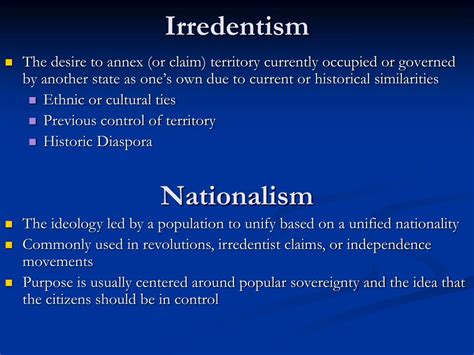Introduction
Irredentism is a political ideology that advocates for the territorial expansion of a nation-state to include areas inhabited by people of the same ethnicity or culture. It is often driven by nationalist sentiments and a desire to create a unified state that encompasses all members of a particular cultural group. This ideology has played a significant role in shaping the political landscape of the world, leading to conflicts, wars, and geopolitical tensions.

Definition and Characteristics
According to the College Board’s Advanced Placement Human Geography (AP Human Geography) course framework, irredentism is defined as “a political ideology that advocates the expansion of a nation-state to include territories that are considered to be part of the nation’s rightful territory based on historical, cultural, or ethnic ties.”
Irredentism is characterized by the following elements:
- Nationalism: A strong belief in the superiority and unity of one’s own nation.
- Territorial claims: Assertions of ownership over land that is currently controlled by another state.
- Historical justifications: Arguments based on past events or cultural connections to support territorial claims.
- Political mobilization: Efforts by nationalist groups to gain support for their irredentist goals.
Historical Examples
Throughout history, irredentism has been a driving force behind many conflicts and wars. Here are a few notable examples:
- Italian Irredentism: After the unification of Italy in 1861, Italian nationalists sought to expand the country’s borders to include areas inhabited by Italian-speaking populations in neighboring regions, such as Tyrol (Austria) and Dalmatia (Croatia). Tensions with these regions contributed to the outbreak of World War I.
- German Irredentism: After the unification of Germany in 1871, German nationalists advocated for the incorporation of German-speaking territories in neighboring countries, such as Alsace-Lorraine (France) and Eupen-Malmédy (Belgium). These irredentist claims contributed to the outbreak of World War I.
- Japanese Irredentism: In the early 20th century, Japanese nationalists sought to expand the Japanese Empire to include territories that were considered to be part of Japan’s “natural sphere of influence,” such as Korea, Manchuria (China), and Southeast Asia. This ideology led to Japan’s involvement in World War II.
Modern-day Irredentism
Irredentism continues to be a significant factor in international relations today. Here are a few contemporary examples:
- Armenian Irredentism: Armenians claim the historical Armenian lands now located in Turkey, which were lost after the Armenian Genocide in the early 20th century.
- Azerbaijani Irredentism: Azerbaijanis claim territories in Armenia, such as the Nagorno-Karabakh region, which has a majority-Armenian population.
- Russian Irredentism: Russian nationalists have advocated for the annexation of Crimea and eastern Ukraine, which have historically been part of Russia or have significant Russian-speaking populations.
Consequences of Irredentism
Irredentism can have both positive and negative consequences for nation-states and the international community:
Positive Consequences:
- National Unity: Irredentism can contribute to a sense of national pride and unity among people who share a common ethnicity or culture.
- Territorial Expansion: In some cases, irredentism has led to the expansion of nation-states, allowing people of the same cultural group to live in a unified state.
Negative Consequences:
- Conflict and War: Irredentist claims can be a source of tension and conflict between nations, potentially leading to war.
- Territorial Disputes: Irredentist claims can lead to territorial disputes, making it difficult to establish clear and stable borders between nations.
- Ethnic Tensions: Irredentist policies can stoke ethnic tensions within multi-ethnic societies, leading to discrimination and violence.
Managing Irredentism
Managing irredentism requires a delicate balance between addressing the legitimate concerns of ethnic groups and maintaining peace and stability. Here are some strategies that have been employed:
- Negotiation and Diplomacy: Nations can engage in negotiations and diplomacy to seek peaceful solutions to irredentist claims.
- International Law: International organizations can play a role in mediating territorial disputes and enforcing international law.
- Federalism and Autonomy: Some countries have opted for federal or autonomous systems that grant regions within the state a degree of self-governance, allowing them to preserve their cultural identity while remaining part of a larger nation-state.
Conclusion
Irredentism is a complex and multifaceted political ideology that has a profound impact on international relations. While it can foster national unity and territorial expansion, it can also lead to conflict, territorial disputes, and ethnic tensions. Managing irredentism requires a balanced approach that addresses legitimate claims of ethnic groups while maintaining peace and stability.
Appendix
Useful Tables
Table 1: Historical Examples of Irredentism
| Country | Irredentist Claims | Result |
|---|---|---|
| Italy | Tyrol (Austria), Dalmatia (Croatia) | Contributed to World War I |
| Germany | Alsace-Lorraine (France), Eupen-Malmédy (Belgium) | Contributed to World War I |
| Japan | Korea, Manchuria (China), Southeast Asia | Led to Japan’s involvement in World War II |
Table 2: Modern-day Examples of Irredentism
| Country | Irredentist Claims | Status |
|---|---|---|
| Armenia | Historical Armenian lands in Turkey | Unresolved |
| Azerbaijan | Nagorno-Karabakh region in Armenia | Contested |
| Russia | Crimea, Eastern Ukraine | Annexed by Russia |
Table 3: Consequences of Irredentism
| Positive Consequences | Negative Consequences |
|---|---|
| National Unity | Conflict and War |
| Territorial Expansion | Territorial Disputes |
| Ethnic Tensions |
Table 4: Strategies for Managing Irredentism
| Strategy | Example |
|---|---|
| Negotiation and Diplomacy | Negotiations between Armenia and Turkey |
| International Law | UN mediation in Kashmir conflict |
| Federalism and Autonomy | Federal system in Switzerland |
